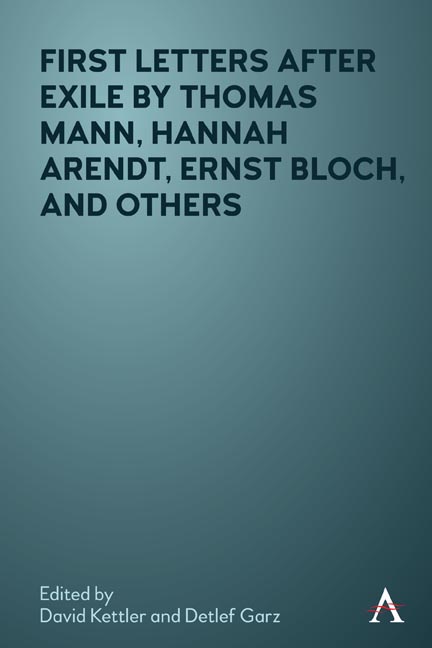Book contents
- Frontmatter
- Contents
- Preface
- Chapter 1 The “First Letters” Exile Project: Introduction
- Chapter 2 “That I Will Return, My Friend, You Do Not Believe Yourself ”: Karl Wolfskehl – Exul Poeta
- Chapter 3 “I Do Not Lift a Stone”: Thomas Mann’s “First Letter” to Walter von Molo
- Chapter 4 Faust Narrative and Impossibility Thesis: Thomas Mann’s Answer to Walter von Molo
- Chapter 5 “That I Am Not Allowed for a Moment to Forget the Ocean of Blood”: Hans-Georg Gadamer and Leo Strauss in Their First Letters after 1946
- Chapter 6 Return into Exile: First Letters to and from Ernst Bloch
- Chapter 7 A Postwar Encounter without Pathos: Otto Kirchheimer’s Critical Response to the New Germany
- Chapter 8 An Exile’s Letter to Old Comrades in Cologne: Wilhelm Sollmann’s Critique of German Social Democracy and Conception of a New Party in Postwar Germany
- Chapter 9 First Letters: Arendt to Heidegger
- Chapter 10 Denazification and Postwar German Philosophy: The Marcuse/Heidegger Correspondence
- Chapter 11 “It Would Be Perhaps a New Exile and Perhaps the Most Painful”: The Theme of Return in Oskar Maria Graf ’s Letters to Hugo Hartung
- Chapter 12 Social Constellation of the Exile at the End of the Second World War and the Pragmatics of the “First Letters”: An Objective Hermeneutic Structural and Sequence Analysis
- Notes on Contributors
- Index
Chapter 3 - “I Do Not Lift a Stone”: Thomas Mann’s “First Letter” to Walter von Molo
Published online by Cambridge University Press: 25 February 2022
- Frontmatter
- Contents
- Preface
- Chapter 1 The “First Letters” Exile Project: Introduction
- Chapter 2 “That I Will Return, My Friend, You Do Not Believe Yourself ”: Karl Wolfskehl – Exul Poeta
- Chapter 3 “I Do Not Lift a Stone”: Thomas Mann’s “First Letter” to Walter von Molo
- Chapter 4 Faust Narrative and Impossibility Thesis: Thomas Mann’s Answer to Walter von Molo
- Chapter 5 “That I Am Not Allowed for a Moment to Forget the Ocean of Blood”: Hans-Georg Gadamer and Leo Strauss in Their First Letters after 1946
- Chapter 6 Return into Exile: First Letters to and from Ernst Bloch
- Chapter 7 A Postwar Encounter without Pathos: Otto Kirchheimer’s Critical Response to the New Germany
- Chapter 8 An Exile’s Letter to Old Comrades in Cologne: Wilhelm Sollmann’s Critique of German Social Democracy and Conception of a New Party in Postwar Germany
- Chapter 9 First Letters: Arendt to Heidegger
- Chapter 10 Denazification and Postwar German Philosophy: The Marcuse/Heidegger Correspondence
- Chapter 11 “It Would Be Perhaps a New Exile and Perhaps the Most Painful”: The Theme of Return in Oskar Maria Graf ’s Letters to Hugo Hartung
- Chapter 12 Social Constellation of the Exile at the End of the Second World War and the Pragmatics of the “First Letters”: An Objective Hermeneutic Structural and Sequence Analysis
- Notes on Contributors
- Index
Summary
On the Special Position of Thomas Mann's First Letter—The History of Its Origin
Among the First Letters sent to Germany from exile, Thomas Mann's letter to Walter von Molo occupies a special place. Striking is, first of all, its early date; its final version written on September 10, 1945, it may have been one of the first letters from exile to reach Germany. The capitulation of the German Reich had occurred only four months earlier, the country was devastated, militarily occupied, and its future political fate still unclear. The broken-down postal service had only been resumed in August and functioned only in fragments at first. The admission of civilians was virtually impossible, and the exiles in the United States could hardly begin to think about returning home. At that time, only those who had left close relatives or very good friends behind in Germany and who were worried about them tried to get in touch with them by mail.
Obviously, it was not the exiled but, above all, those who had remained at home who wanted to get in touch, mostly for opportunistic reasons. In any case, as his diary shows, Thomas Mann received several letters voiced in justificatory or lamenting tones from acquaintances and strangers in Germany in the summer of 1945. This evoked nothing more than a head shaking—and by no means the impulse to enter into a dialogue. To a letter from the art historian Emil Preetorius, a former friend of his, which arrived as early as July 12 (TB p. 226), for example, he did not answer at first, only to groan shortly afterward: “A German letter, once again, from Hamburg. Complaints about failures in differentiation and request for remedy (!)” (TB p. 247). The insufficient differentiation between Nazis and alleged or actual Nazi opponents on the part of the occupying powers was a frequently voiced complaint in the western zones of Germany in the first postwar months.
Another peculiarity of Thomas Mann's letter is that it was not written on his own initiative, but under strong pressure—in response to an open letter by Walter von Molo, which had been published in the Hessische Post and the Münchner Zeitung on August 4.
- Type
- Chapter
- Information
- Publisher: Anthem PressPrint publication year: 2021



